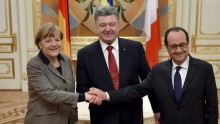President of Ukraine Petro Poroshenko will meet in Berlin in the afternoon of August 24 with German Chancellor Angela Merkel and French President Francois Hollande to discuss the escalation of the crisis in the Donbas. The news was made public late on August 18 by France’s Foreign Minister Laurent Fabius, the Reuters news agency reports. “Firstly, military operations must stop, arms be withdrawn, and attacks on OSCE observers cease. Secondly, we need to achieve right conditions for elections in the Donbas,” Fabius was quoted as saying by the agency.
French diplomacy chief expressed hope that this meeting would allow progress to be made on both counts. In addition, he noted the need to reach a solution to the crisis by December.
The Ukrainian Ministry of Foreign Affairs could offer no comment officially on the future meeting involving Poroshenko and the leaders of the two major European countries. Our source at the ministry’s office in Mykhailivska Square reported that this meeting was to be held as an emergency action and at the initiative of the Ukrainian party. “We want to inform our allies in detail on the deteriorating situation and discuss our future joint steps,” the source who asked not to be named told The Day. According to him, most likely, the Ukrainian president will talk about the need for clarity on the prospects of Western sanctions against Russia and their extent, united stand in negotiations with Russia, and military-technical support.
Interestingly, an article appeared on the website of the Center for European Policy Analysis (CEPA), Washington, before the meeting in Berlin, entitled “West Legitimizes Ukraine’s Division” (http://www.cepa.org/content/west-legitimizes-ukraines-division). Its author, the CEPA’s Senior Fellow Janusz Bugajski, states: “Russia is consolidating a new ‘frozen conflict’ in Europe with Western assistance. In response to Moscow’s threats that it will expand the war in Ukraine, Washington, Berlin, and Brussels have become complicit in legitimizing rebel control over parts of the Donbas region. Even if there is no mass Russian invasion this summer, the recognition of Kremlin proxy governments will have serious consequences for Ukraine’s integrity, challenge security arrangements throughout Europe’s east, and encourage Moscow’s territorial ambitions.
“The government in Kyiv is trapped in the middle, trying to balance the need for close relations with the West, on whom it is dependent for economic and diplomatic support, with its core national interest of maintaining independence and integrity, and preventing a frozen conflict on its territory. It would be a tragic irony if Kyiv’s efforts to transform the country into a productive European democracy fail because the West legitimized a fractured and dysfunctional state in order to accommodate the Kremlin. The struggle over Ukraine has again demonstrated that Washington lacks an effective strategy toward Russia other than a reactive approach that continues to concede ground to Moscow in the vain hope that this will satiate Putin’s appetite.”
Susan STEWART, German Institute for International and Security Affairs, Berlin:
“I see this meeting as an attempt to ensure that Germany, France, and Ukraine are still ‘on the same page’ with regard to the Minsk agreements, and to discuss with Poroshenko his assessment of the recent escalation of fighting in Donbas. There is certainly concern here about this escalation and questions about how best to react to it and about what further developments are likely to occur. Additional topics will probably be the problematic situation of the OSCE mission in Ukraine, constitutional reform efforts (especially decentralization), and the preparations for the local elections scheduled for October. It is rather symbolic that the meeting will take place on the anniversary of Ukraine’s independence, thus providing an opportunity to reiterate Western support for the country’s sovereignty.
“I doubt that after this meeting any specific actions will be taken which could convince Putin and the separatists to stop the fighting. I don’t see a consensus within the EU currently to strengthen sanctions against Russia, and other instruments are not under discussion. And since in the February version of the Minsk agreements there are no direct commitments entered into by Russia, it is difficult to make specific demands on Russia except that it increases pressure on the separatists.”
Edward LUCAS, senior vice president of the Center for European Policy Analysis, London:
“Even if the West tries to ignore Russian aggression the facts are clear. This is not a frozen conflict. It is a hot one.”
Stephen BLANK, senior fellow at the American Foreign Policy Council, Washington D.C.:
“This scenario is possible but not necessarily predetermined to come into being. There is obviously some support in Europe for it and maybe here [in the US. – Ed.], but continued fighting precludes its coming to pass.”
William B. TAYLOR, executive vice president at the U.S. Institute of Peace:
“We have been pretty clear: economic sanctions will stay on the Russians until they withdraw their forces from the parts of the Donbas that they occupy. If the Russians invade further, we will impose additional, harsher sanctions. Similarly, the sanctions put in place in response to the forcible annexation of Crimea will stay in place until they resolve the situation to the satisfaction of the Ukrainian government in Kyiv.”








